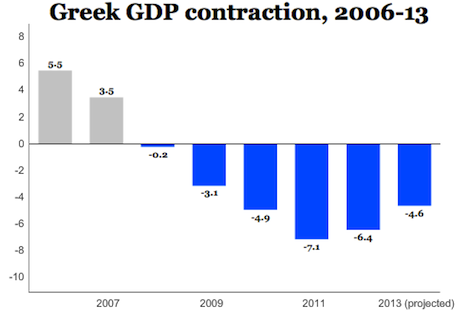With the Greek far left set to take power after Sunday’s staggering parliamentary elections, its next prime minister Alexis Tspiras will be just one of many key figures who will now become the central players in the latest chapter of the European Union’s economic policy debate.![]()
After Tspiras, no one will be more important than the economic advisers to whom the new government will entrust its attempt to reverse Greek economic policy and to negotiate debt relief from skeptical European Union leaders and international bondholders.
* * * * *
RELATED: EU should give Tsipras a chance to govern
* * * * *
Among the chief economic advisers to Tsipras and the soon-to-be-governing SYRIZA (the Coalition of the Radical Left, Συνασπισμός Ριζοσπαστικής Αριστεράς) are a handful of colorful personalities, from moderates to Marxists, all of whom will shape Greek economic policy in the years ahead.
Varoufakis: the political neophyte and telegenic economics professor
Yanis Varoufakis, an economics professor at the University of Athens, is widely tipped to become Greece’s next finance minister or, at the very least, lead the new government in negotiations with the troika — the European Central Bank, European Commission and the International Monetary Fund — and other EU leaders. Until very recently, Varoufakis was an outsider to Greek politics. He’s not a politician and, until recently, was a visiting professor at the University of Texas in Austin.
Varoufakis, however, was invited to run for a parliamentary seat by SYRIZA’s leaders. His international profile (Varoufakisis half Australian) and fluent English skills mean that he could soothe international markets as the chief economic spokesperson for Greece’s new government. A former adviser to George Papandreou in the early 2000s, Varoukakis has been a strident critic of the austerity measures that, first Papandreou and, since 2012, outgoing prime minister Antonis Samaras have accepted as conditions for Greece’s two bailouts, totaling €240 billion. In his announcement that he would stand as a candidate for the Hellenic Parliament, he compared that austerity to ‘fiscal waterboarding’:
Instead of discussing, in the European Union’s fora, the nature of our systemic crisis, the powers-that-be were busy fiscally waterboarding proud nations, letting them take a few short breaths before submerging them again into the waters of illiquidity.
Somewhat unusually for a European finance minister, Varoufakis has not shied away from criticizing the United States. Three years ago, Varoufakis wrote a book, The Global Minotaur, that paints a menacing portrait of the role of US economic policy vis-à-vis the rest of the world and American workers. Continue reading Meet Greece’s new economic policymakers




